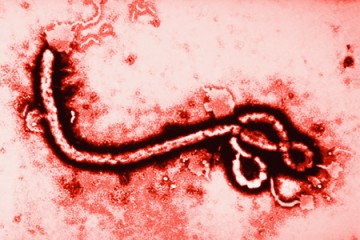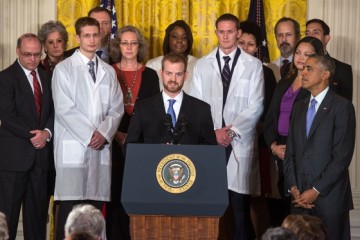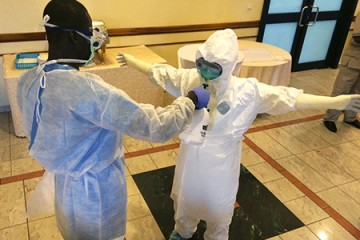As Ebola continues to all-too-swiftly spread and inflict its human toll in West Africa, overstretched and undermanned health care systems need all hands on deck. Johns Hopkins wants to help send in a cavalry.

Image caption: David Peters
A team of faculty members from the Bloomberg School of Public Health, School of Nursing, and the School of Medicine are assisting in an effort to train 1,000 Democratic Republic of Congo health care workers—including nurses, doctors, lab techs, and hygienists—to combat the outbreak in Liberia, Sierra Leone, and Guinea.
The health care workers first will be trained in the DRC, then sent in waves to the West African locations where they are needed most. The first group will be deployed later this month.
"There simply are not enough health care workers in regions of Liberia now to effectively deal with this outbreak," said David Peters, chair of the Department of International Health at the Bloomberg School and the team leader for the Johns Hopkins involvement in this initiative. "We need them."
To date, a half-dozen Johns Hopkins faculty members—Nancy Glass, Anjali Kohli, Trish Perl, Jo Ellen Harris, Peter Winch, and Elli Leontsini—have travelled to Kinshasa (the DRC's capital) and Liberia to provide technical support to develop and revise protocols, training materials, and community mobilization strategies, and to train trainers for infection prevention and control procedures. The training seeks to harmonize Liberian standards and protocols, Congolese experience, and best practices from the field.
Johns Hopkins researchers will all also work with those in Liberia and DRC to improve data collection and analysis, and to improve modeling based on this data for both epidemic response and preparedness.
The initiative, which will be logistically handled by UNICEF, is based on the Democratic Republic of Congo's experience in effectively dealing with seven Ebola outbreaks since 1976, and that government's offer to provide trained health workers to Liberia to assist with combating the current Ebola outbreak.
Peters, who recently returned from Liberia, said the DRC has a lot to offer, both in terms of manpower and capability.
"They've witnessed firsthand that a quick response is the most important," Peters says. "You also need comprehensive community outreach, good case identification and isolation, good burial measures, and good medical care. This is the type of knowledge we're looking to help pass on."
The Congolese health workers will work in teams alongside paid Liberian health workers and community volunteers under Liberia's Community Care Center approach. Specifically, the Congolese will staff new and existing Ebola Treatment Units (ETUs) and Community Care Centers (CCCs) to reduce Ebola transmission and mortality by using best practices for early case finding, infection prevention, personal protection measures, supportive care, enhanced diagnostics, and improved patient monitoring.
The majority of ETUs and CCCs will be clustered in rural areas where there is a dearth of health care professionals.
ETUs, the main locations for treating probable and confirmed Ebola cases, have laboratory capabilities and triage cases, as well as take referrals for care of confirmed and probable cases. CCC staff organize community mobilization, screen patients, treat suspected cases, and refer confirmed cases to ETUs for treatment. Both ETUs and CCCs are built on sites of existing hospitals and health centers—with the exception of some large stand-alone ETUs in Liberia's capital, Monrovia—and are linked to community burial teams and case finding.
Peters says the training will continue in Kinshasa until about 1,000 health workers are made available. He adds, however, there are no guarantees that this number of people can be identified and trained.
"It is a concern, but with good will and good effort we hope to move forward," he says. "We are planning for success."
Posted in Health
Tagged infectious disease, ebola










